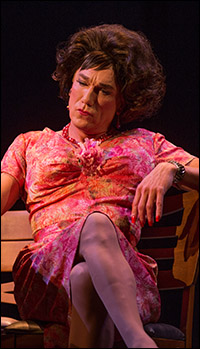
*
Throughout his career on the Broadway stage, Patrick Page has demonstrated his versatility in more ways than one. With a resume that ranges from the evil uncle Scar in The Lion King to the title role in Dr. Seuss' How the Grinch Stole Christmas, Page has shown his affinity for playing the "bad guys" of Broadway. He has also tackled the classical plays Julius Caesar and A Man for All Seasons and modern-day works, including the stage adaptation of the John Grisham novel A Time to Kill. Page even showed off his rock-star side during the second-act rap number "A Freak Like Me Needs Company" while playing the Green Goblin in Spider-Man Turn Off the Dark.
Page's latest project, however, allows him to show off a completely new aspect of his talent. He plays the role of George/Valentina in Casa Valentina, Harvey Fierstein's new play about an upstate resort where straight men travel to dress as women. George's wife, Rita, who is played by Mare Winningham, supports him in his efforts to establish a community of support and sisterhood.
Page spoke with Playbill.com about Casa Valentina's meaning to a 21st-century audience, the ways in which this role is opening his eyes to new aspects of society and the challenges of walking in high heels.
You're creating a new kind of character on Broadway — a heterosexual man who likes to dress in women's clothing. What was it about Casa Valentina that drew you to the project?
Patrick Page: The subject matter hadn't been explored, and the role was so deep and rich. And the script is very funny, but the subject matter really isn't. The subject matter is deeply human. And so the play — although obviously Harvey Fierstein can write an incredible one-liner and the thing just crackles — is also very, very moving and deals with very serious subject matter. George met his wife at the wig shop she runs. Tell me about your character's marriage. Is she accepting of George's cross-dressing?
PP: Rita and George have this marriage that all of the other transvestites in the play look to and admire as a kind of magical storybook marriage because — remember, this is 1962 — and wives who can accept their husbands dressing as women are still very hard to find today. In 1962 they were like unicorns, and she's the unicorn. So everybody looks to this marriage. The play is also about this marriage and the challenges it goes through over this weekend as they try to sort of codify what they are.
 |
||
| Patrick Page |
||
| photo by Joan Marcus |
PP: Harvey hasn't had a straight play on Broadway in 30 years. So this is an event, which I think any serious theatregoer would want to be a part of... I think if people hear Harvey Fierstein and guys in drag, they think, "Oh, I know what that is. I've seen La Cage. I've seen guys in dresses. I've seen Kinky Boots." Well, you don't. That is not what this is. This is heterosexual men with families who have a safe place they can go and essentially hide on the weekends. But in this place, they can be themselves, and when they go back to their jobs, they can't. And this is a group of people that's real. About 80 percent of cross dressers today are heterosexual men, which no one believes.
Casa Valentina is inspired by an actual place, the Chevalier d'Eon. How did you prepare for this role? What kind of research did you do?
PP: We've been studying it. And really coincidentally, Mare and I have happened on a lot of the same books. And when you begin reading their experiences, it is so moving and complicated, and it's taken me more deeply into trying to understand the transgender community and the challenges they still face. Not still. The challenges they face every day, which are the simplest things. What restroom do you use? When we come to this play, there are going to be probably a lot of transgender people in the audience. So the house staff is going to have to learn all about — OK, how do we negotiate the restroom situation? These are things we normally don't have to think about every day, and we're from a pretty progressive educated community — the theatre community. So I think people are in for a wild ride.
It's interesting to think about how fluid identities can be.
PP: It's so funny. The more honest we are with each other, the more someone says, "Oh, wow, I really don't fit into your category." It's very, very threatening for some people, of course. They need to know: What category? Where do I put you? The most basic thing, the thing the doctor says immediately to your father or mother on your first day is — is it a boy or a girl. If I can be sure of nothing else, I can be sure of that. And once you take that away, you put people into a world that challenges their fundamental beliefs, which is what theatre should do.
How is it going with the heels? Has it been difficult learning how to walk in them?
PP: I like them. Part of it is it's good shoes, and part of it is I try to wear them six hours a day. I need to be somebody that people believes dresses as a woman every single weekend and is comfortable and feels most comfortable in that way.
(Carey Purcell is the Features Editor of Playbill.com. Her work appears in the news, feature and video sections of Playbill.com. Follow her on Twitter @PlaybillCarey.)









